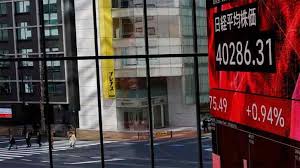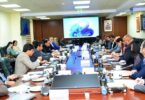TOKYO (Reuters): Japan’s main stock benchmark breached the 40,000-point level for the first time on Monday, continuing a rapid rise to new peaks this year that has been spurred by corporate governance reform and cheap valuations.
As technology shares jumped, tracking their US counterparts, the Nikkei share average rose 0.79 per cent to 40,226.83 by the midday close, smashing through an intraday high of 39,990.23 hit on Friday.
Overseas investors appear to be leading the buying and many seem to be investing from a medium to long-term perspective, said Masahiro Ichikawa, chief market strategist at Sumitomo Mitsui DS Asset Management. “I think the market will continue to rise,” he said.
Japanese tech shares were boosted by the ongoing artificial intelligence rally in US stocks that saw the S&P 500 and Nasdaq to record highs on Friday.
Chip-testing equipment maker Advantest, which counts US artificial intelligence firm Nvidia among its customers, was up 3.9pc. Chip-making equipment giant Tokyo Electron gained 2.7pc.
The shares in those two companies added a combined 175 index points to the Nikkei’s 316-point rise during the morning session.
Shin-Etsu Chemical, which manufactures semiconductor silicon products, rose 2.2pc.
JSR Corp, a major maker of photoresists used in chipmaking, jumped 4.4pc after a media report that state-backed fund Japan Investment Corp (JIC) plans to launch a tender offer for the shares this month.
The broader Topix was up 0.16pc at 2,713.79.
Among the Tokyo Stock Exchange’s 33 industry sectors, the electric machinery was the third-largest gainer, up 1.2pc, after pulp and paper firms which climbed 2.1pc and miners which rose 1.3pc.
CORPORATE CAPEX JUMPS
Japan’s corporate spending on plant and equipment jumped in the fourth quarter, suggesting likely positive revisions to data that showed the economy unexpectedly tipping into recession last year.
The solid capex data could also bolster the case for the central bank to normalise its extremely accommodative monetary policy in the near term. Investor focus is now on this year’s wage negotiations, which could deliver more hefty pay hikes, a prerequisite for ending negative interest rates.
Capital expenditure rose 16.4pc in the fourth quarter from a year earlier, and 10.4pc on a seasonally adjusted quarterly basis, the Ministry of Finance data showed on Monday.
The data will be used to calculate revised gross domestic product figures due on March 11. Preliminary estimates last month showed Japan fell in October-December for the second straight quarter, the definition of a technical recession, weighed in part by a decline in the GDP’s capex component.
Takeshi Minami, chief economist at Norinchukin Research institute, said revised GDP data could now be upgraded to show an expansion in the fourth quarter, which would effectively mean the economy managed to avoid a recession at the end of last year.
“It could be encouraging to the Bank of Japan even though it may not have a direct implication on monetary policy,” Minami said. “Wages are in focus and we are still expecting the central bank to end negative rates in April rather than March.”
Monday’s MOF capex data also showed corporate sales rose 4.2pc quarter on quarter, and recurring profits increased 13.0pc in the October-December quarter from the same period a year ago.







